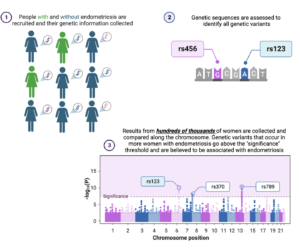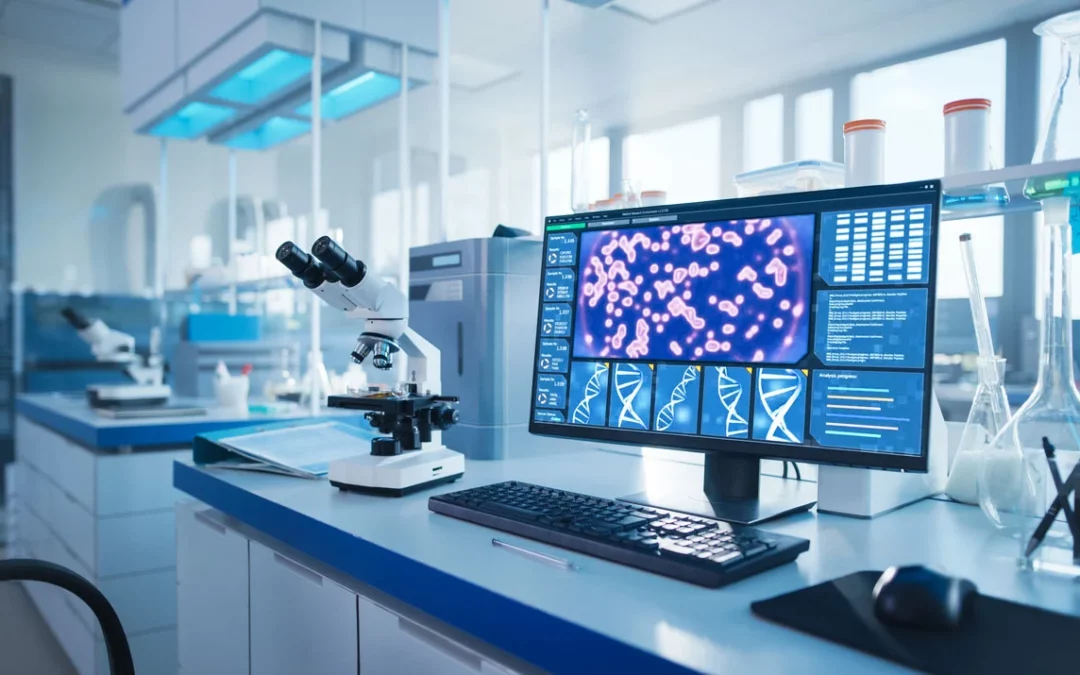Written by Dr Brett McKinnon, Research Fellow, Institute for Molecular Bioscience, UQ
Endometriosis in the family
It is something you have probably noticed. Research supports the chances that endometriosis will run in the family. If someone in your family has it, you are more at risk of also suffering from endometriosis.
This link is because genetics have a role in the risk of the diseases developing. It has been estimated that up to 50% of the risk of suffering from endometriosis is genetic. How and whether we can use that to improve diagnosis and management is an important question.
What are genetics?
Genetics is the blueprint for how the body works. Your genetic sequence contains everything your body requires to make the gene, proteins, cells and traits that make you, you. Although the genetic sequence of all humans is essentially very similar we all have small mutations, known as “single nucleotide polymorphisms”. These are mutations that are common in the population and have been collected over years of human development. By themselves, they are completely normal and have very little effect. IN combination however they can influence each of us differently.
Genetics and endometriosis
Endometriosis is what is called a complex genetic disease. This means that, unlike some conditions where there is a clear link between one gene and the condition, for endometriosis, this is not the case.
Instead, for endometriosis, there are lots of these common mutations, each with a very small effect, that when collected together increase the risk of endometriosis. Each one by itself is not enough, but when combined together, or in certain combinations, the risk of endometriosis will be increased.
Research into the genetics and endometriosis
While there is ongoing research to identify these common genetic variants we do not yet know what all of these mutations are, or what the right (or wrong) combination might be.
Large international consortiums of researchers are working to identify the genetic regions using samples from hundreds of thousands of patients. They need this many patients because the contribution of each genetic region is so small that large sample sizes are needed. These studies are ongoing and are helped greatly by the willingness of people with endometriosis to contribute the time and samples.

Figure 1: Study genetics and endometriosis
Work is now also focussing on understanding the consequence of each of these mutations. It is hoped this will help us understand why these mutations increase the risk of endometriosis.
Using genetics in the diagnosis and management of endometriosis
There is hope that genetic information can improve the diagnosis and management of endometriosis. We are however not there yet.
As each individual effect is so small it means getting an accurate estimate of endometriosis risk through a genetic profile is difficult. We have so far found only approximately 5% of the risk for endometriosis through genetic variants. There is still lots more to be discovered. This means tests based on genetics are not likely to be very accurate, yet.
We also know that only approximately 50% of the risk for endometriosis is genetic. Understanding what the other 50% is will also be important. This could contribute to better diagnostics.
Where to next?
Researchers are continuing to work to get a better understanding of how genetics contributes to endometriosis. They are looking to identify more genetic regions linked to endometriosis. They are also investigating the consequence of these mutations. This includes looking at how these mutations affect the level of genes and proteins produced, and whether combinations of mutations might be useful for the diagnosis of different types of endometriosis, or to understand different symptoms. We are also studying these genetic variants in individual cells might provide better answers
It is hoped if we can understand the consequence of each of these mutations it will improve the power of using genetics in diagnosis and management.
While there is still a lot to discover about the genetics of endometriosis, we have at least started the journey.

